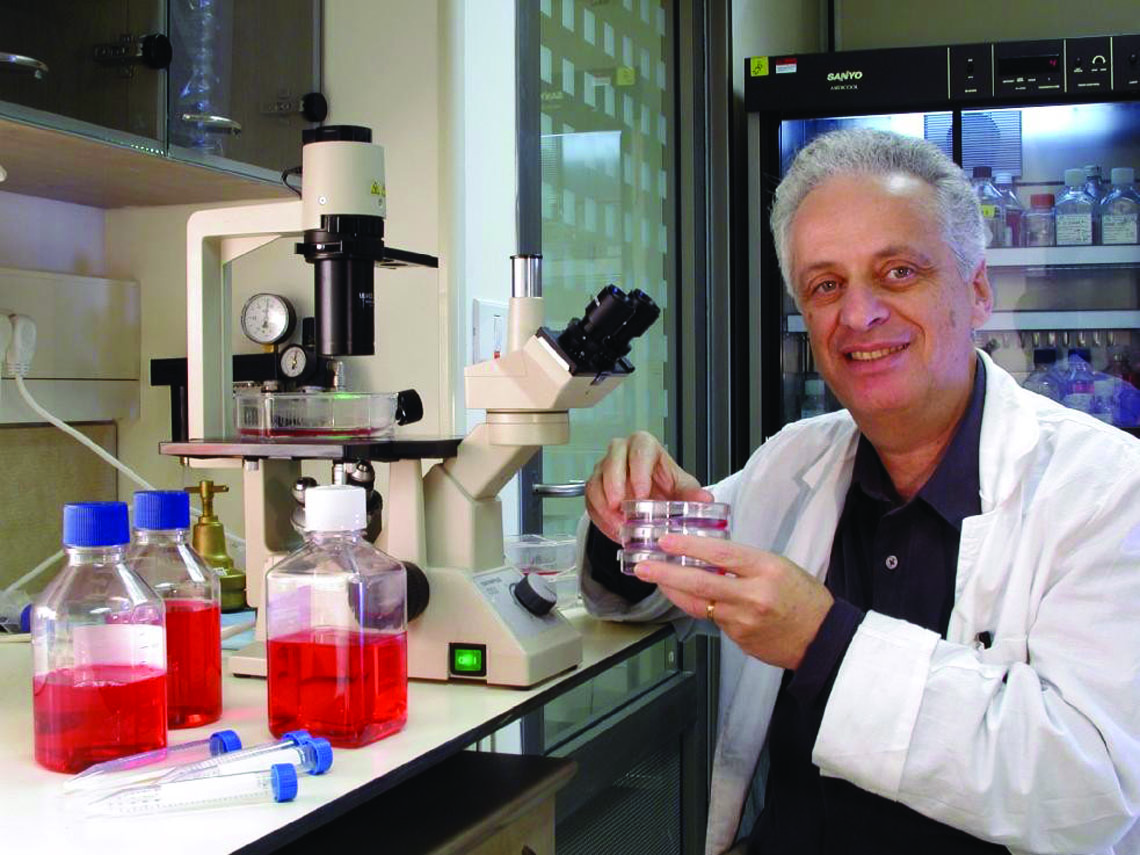 Dr. Israel Vlodavsky, whose research has been funded periodically by ICRF, in his lab in Israel. Photo courtesy of the Israel Cancer Research Fund
Dr. Israel Vlodavsky, whose research has been funded periodically by ICRF, in his lab in Israel. Photo courtesy of the Israel Cancer Research Fund For the past six months, the Israel Cancer Research Fund (ICRF) has been collaborating with City of Hope in Duarte to advance understanding of cancer and further develop life-saving treatments and prevention strategies.
The Jacki and Bruce Barron Cancer Research Scholars Program at City of Hope has facilitated the exchange of resources, ideas and knowledge between ICRF’s cancer investigators — who are from four Israeli universities — and top researchers at City of Hope. The joint venture was made possible thanks to a $5 million grant from the Harvey L. Miller Family Foundation, which previously had separate philanthropic ties to both the ICRF and City of Hope.
“This relationship with City of Hope is validating for us,” said Eric Heffler, national executive director of ICRF. “It helps us raise awareness and continue on with our world-class research.”
Founded in 1975, ICRF has supported the work of numerous Nobel Prize winners responsible for milestone discoveries in cancer research. It has awarded more than 2,300 grants to investigators at 24 institutions throughout Israel. The New York-based nonprofit, with offices in six cities, including Los Angeles and Coachella Valley, aims to keep many of Israel’s premier scientists at home instead of having them globetrotting to secure research funding.
City of Hope is a pioneer in the fields of bone marrow transplantation, genetics, and independent research and treatment for cancer and diabetes.
The new program features four key initiatives:
• Three $150,000 collaborative grants awarded annually to support the research of City of Hope and Israeli scientists.
• Two post-doctoral fellowships at City of Hope for promising Israeli scientists selected by ICRF.
• Six-month sabbaticals for established Israeli scientists at City of Hope and for City of Hope researchers in Israel.
• An annual symposium for City of Hope and ICRF researchers to share findings.
The program’s first symposium is scheduled for November on City of Hope’s main campus. The symposium is expected to feature presentations from Israeli and American research partners who will be finishing the first year of their work together, a talk from an Israeli scientist who has been on sabbatical at City of Hope, and keynote addresses from high-profile cancer researchers.
Matthew Ruchin, associate director of administration for City of Hope’s Comprehensive Cancer Center, said both institutions initially were apprehensive about the distance separating their respective researchers.
“We expected to encounter obstacles with that,” Ruchin said. “But that hasn’t been the case.”
Ruchin said that in the past, faculty at the Hebrew University of Jerusalem’s Lautenberg Center for Immunology and Cancer Research could not send massive data files over the internet or ship clinical research samples to City of Hope, and vice versa. Now, he said, “laboratories that are thousands of miles apart can feel like they’re right next door to each other.”
The partnership with ICRF is the only one City of Hope is engaged in that involves formal ties with medical institutions outside the United States. It has similar arrangements with Caltech and the UC Riverside faculty.
For Rob Densen, ICRF president, a central aim of the program is to showcase the ICRF’s mission to the Jewish community of Greater Los Angeles. On a trip to L.A. in early March, Densen told the Journal that many potential donors hadn’t even heard of the organization. He said he hoped to capitalize on the exposure a relationship with City of Hope — whose A-list celebrity support makes it widely known — could bring to ICRF.
“You have a tremendously diverse Jewish community in Los Angeles. You know the one thing they all share? Cancer. It cuts across geography, race, creed and religion,” Densen said. “I think [ICRF] is the perfect charity. It’s Israel and it’s cancer, the scourge of humankind.”
Densen also hopes that more awareness about ICRF will aid in Israel’s fight against the Boycott, Divestment and Sanctions (BDS) movement, as it demonstrates Israel’s impact on a matter of world concern.
“This is a stab right in the eye of BDS,” he said. “And it fits in perfectly with the theme of tikkun olam, repairing not just your neighborhood, your countr, or your religion, but repairing the entire world. That’s what animates my involvement here. Cancer research from Israel benefits everyone.”
Dr. Israel Vlodavsky, a professor in the Cancer and Vascular Biology Research Center at the Technion-Israel Institute of Technology in Haifa, said his groundbreaking research on the curtailing of tumor growth has been funded periodically by ICRF since 1982 and consistently for the last 10 years. Vlodavsky, who traveled to Los Angeles in March with Heffler and Densen, said the partnership with City of Hope should play a key role in furthering ICRF’s efforts to fund Israel’s cancer researchers.
“This type of partnership will continue to allow ICRF to find promising young scientists during the most exciting time in cancer research,” Vlodavsky said.
Although both City of Hope and ICRF have reputations for producing results in cancer research, their collaborative efforts so far have not produced any major breakthroughs.
“Research is a funny thing,” Ruchin said. “It takes time for it to progress. We’ve only been at this for six months now, so we’re really focused on the building of relationships with colleagues in Israel. I’m more excited to see how things progress in the next three to four years.”





















 More news and opinions than at a Shabbat dinner, right in your inbox.
More news and opinions than at a Shabbat dinner, right in your inbox.